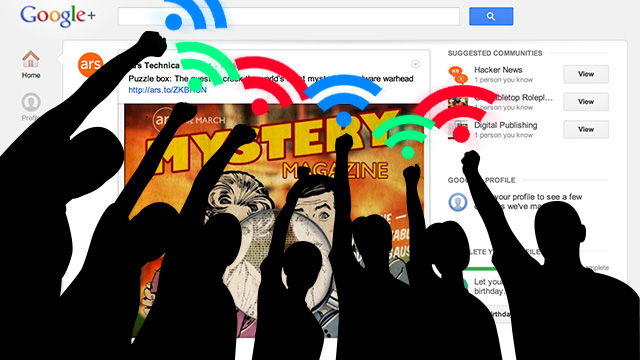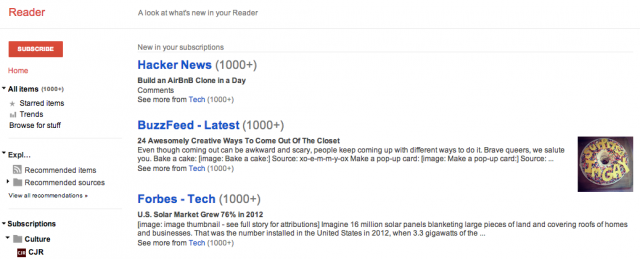
A collective wail went out Thursday morning as millions of Google Reader users awoke to find that Google had announced plans to shut down the service by July 1. Barely half a day has gone by since the announcement, and a petition to prevent the closure has already garnered 50,000 signatures. Reader users will not go gentle into that good night—there are a lot of them, and they were happy with how things were. Why would Google kill such a successful product?
We’ve heard plenty of arguments against RSS—mainly that the format is shriveling or dying or being slowly replaced by Twitter and Facebook feeds. Google, being a creature of the Internet, can’t be blind to this trend. Due to the sheer size of the outcry against Reader’s discontinuation, though, it’s clear RSS is still in heavy use. But there’s a better—or at least a more-beneficial-to-Google—place for that RSS-like information to flow. That place is Google+.
After all the initial excitement about the social network, Google+ has limped along as sort of a vestigial supplement to the Google experience. Buttons like “Share” or “+1” across Google services, especially in Reader, all seem to want to lead you back to Google+, but they don’t seem to draw as many people in as Google would like. But if the search giant were to draw an already-successful service into Google+, it could find itself with many more (possibly grudging) Google+ users. If you can’t take Mohammed to the mountain...
While I can’t say I'm a fan of squirrelly attempts to draw me into Google+, I must admit that RSS feeds could be a good fit. A site’s RSS feed could flow into into a Google+ news feed exactly the way a “circled” person or brand currently does.
Stories could appear as bigger, better versions of the single-line entry in Reader, more like the big-photo entries that Facebook’s new News Feed uses. Even better, Google+ entries have built in re-sharing tools as well as commenting threads, encouraging interaction.
By threading RSS feeds into Google+, Google would remove the extra step of sharing an item to a Google+ feed. The story would already be there for every subscriber, ready for perusal and comments. If users wanted friends who may not follow the brand to see the post, they could easily re-share it.
Google could even take this a step further and encourage brands to incorporate their RSS feeds into their Google+ pages, so every story automatically shows up as a Google+ post. By doing that, Google removes the extra step of sharing each post to Google+, and brands get a lower-friction Google+ experience. Google gets a more active user, and by extension, more active readers. When asked about this possibility, Google stated only that it "had no more plans to share at this time."

The only drawback I foresee with this approach is information glut, which Facebook is attempting to deal with in a ham-fisted way that is angering many page owners.
Large-format, uncensored RSS feeds in Google+ encourage close examination, and therefore a lot of scrolling, so Google+ would either need to develop a way to groom its feeds like Facebook does, or else provide a more skimmable interface. I have no doubt in Google’s ability to develop an algorithm to promote the most attention-getting stories to large-format posts with big photos and headlines, while reducing less important items to lines of text. That process could possibly even be customized user-to-user, so that each person can subscribe to the same feed but see different stories promoted based on their interest history or how many of their friends have interacted with them.
If Google could pull this off, it would beat Facebook and Twitter to removing a point of friction that brands currently have to deal with to share content. By automating sharing, Google could set itself up with waves of Google+ content that the still-sizeable pool of RSS users would flock to see.
As an avid Google Reader user, I’ll be sad to see it go. But I don’t think it’s really going to leave.
reader comments
155